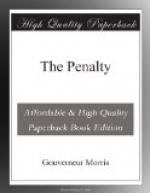“You’ve offered to take me just as I am, with all my encumbrances, and to help me fight things through to a good finish. And I think that is pure folly on your part. But there’s going to be no more folly on mine. I’m going to be a fool. Barbs—come here!”
He held out his arms, and she threw herself into them.
“Is to-morrow too soon, Barbs?”
“We could hardly arrange things sooner, but to my mind to-morrow is not nearly soon enough.”
“What will your father say?”
“Why, if he’s the father I think he is he’ll bless us and wish us good luck. There’ll be an awful lot to do. Hadn’t we better jump into a car, run over to Greenwich, and get married? That will be just so much off our minds.”
LII
The young Allens began their new life by plunging themselves still deeper in debt. Their honeymoon was very short. They spent it on Long Island Sound in a yacht which Wilmot borrowed over the telephone, just before they left Clovelly to be married. On the sixth day they went West. In Salt Lake City they foregathered with a mining engineer to whom Wilmot had secured letters. This one fell in love with Barbara, closed his office and went with them into the hills for ten days. They came out of the hills with brown faces and sparkling eyes. The engineer opened his office and dictated his report of their mines to his stenographer. During this work of enthusiasm he occasionally sighed, and the stenographer knit her brows.
“Now then,” said the engineer to Wilmot and Barbara, “if my name is any good in New York, you can raise all the money you need on that document. If you can’t, telegraph, and I can raise it here.”
“But,” said Barbara, growing very practical, “if the money can be raised here, why blow in two car-fares and a drawing-room from here to New York and back?”
[Illustration: The engineer made generous terms across the dinner-table]
“Why,” the engineer stammered a little, “I thought you’d have lots and lots of friends that you’d want to let in on the ground floor. But if you haven’t, and if my money is as good as another’s—you see, it’s a grand property—I’m not above longing for an interest in it myself.”
“I can’t deny,” said Wilmot, who had been worrying himself dreadfully about finding the means, “that this looks like easy money to me.”
The engineer made generous terms across the dinner-table, and the young Allens borrowed his money from him.
“I suppose,” said the engineer hopefully, “that you’ll run out from time to time to see how things are getting on?”
“Run out?” exclaimed Barbara; “we are going to live with the proposition until it goes through or under. Aren’t we, Wilmot?”
“I hoped you’d feel that way about it, Barbs.”
“You knew I would.”




